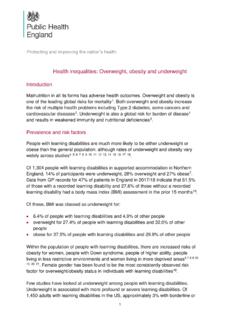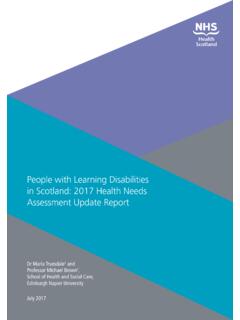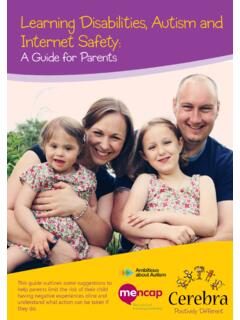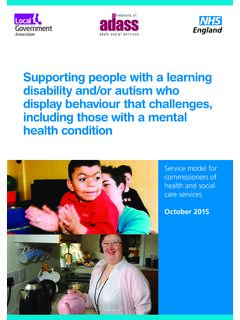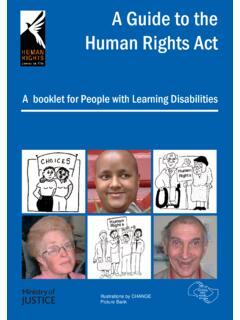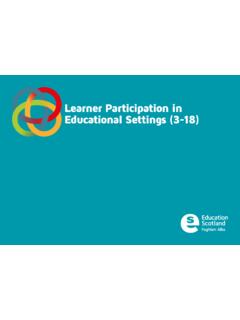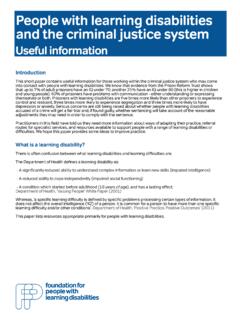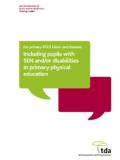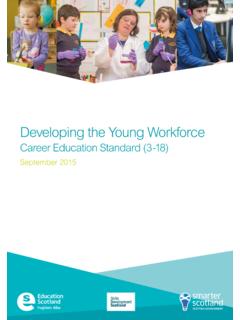Transcription of Supporting people with profound and - PMLD Link
1 Supporting people with profound and multiple learning disabilities CORE & ESSENTIAL SERVICE STANDARDS. COVER ILLUSTRATION: NIKI DOUKA. Supporting people with profound and multiple learning disabilities CORE & ESSENTIAL SERVICE STANDARDS. 1st EDITION, NOVEMBER 2017. Dr Thomas Doukas HEAD OF INCLUSIVE RESEARCH & INVOLVEMENT, CHOICE SUPPORT. Annie Fergusson SENIOR LECTURER SEN AND INCLUSION, UNIVERSITY OF NORTHAMPTON. PMLD LINK JOURNAL AND FAMILY CARER. Michael Fullerton DIRECTOR OF QUALITY AND CLINICAL CARE, CARE MANAGEMENT GROUP. Joanna Grace FOUNDER OF THE SENSORY PROJECTS. Contents Foreword.. 7. Supporting statements and endorsements .. 9. Introduction .. 11. Why have we developed the Core & Essential Service Standards?.. 11. Towards a working definition of profound and multiple learning disabilities (PMLD) .. 12. people with PMLD descriptions and numbers.. 12.
2 Aims of the Standards.. 15. Who are the Standards aimed at?.. 16. How to use the standards? .. 18. Core & Essential Service Standards Organisations .. 20. Standard 1: Leadership.. 20. Standard 2: Quality .. 21. Standard 3: Staff development (skills and confidence) .. 22. Standard 4: Physical Environment .. 23. Standard 5: Communication .. 24. Standard 6: Health and Wellbeing..25. Standard 7: Social, Community and Family Life .. 26. Individuals.. 28. Standard 1: Communication .. 28. Standard 2: Health and Wellbeing..30. Standard 3: Meaningful/Quality Relationships.. 32. Standard 4: Social and Community Life.. 33. Standard 5: Meaningful Time.. 33. Standard 6: Transitions.. 34. Acknowledgements.. 36. Further reading .. 37. Resources .. 38. A person's ability to communicate is not dependent on their being able to master certain skills, it is dependent on our ability to listen and communicate responsively.
3 Jo Grace, The Sensory Projects 6.. Foreword The Core and Essential Service Standards are designed to improve the lives and life experiences of people with profound and multiple learning disabilities . It was felt that time and effort was required to bring profound and multiple learning disability provision in line with initiatives implemented to improve the lives of people with learning disabilities and autism, who present with behaviours which challenge'. In terms of population, this group of children, young people and adults are small in number, often isolated and marginalised. Indeed, in terms of policy, this is a group that is often forgotten or considered as an afterthought. Professor Jim Mansell, sadly deceased, in his Raising our Sights' Report of 2010 found that families of people with profound and multiple learning disabilities often had to struggle to get the services and support they need, that this group of people faced discrimination, prejudice, and low expectations.
4 Seven years on and little has altered in terms of policy and life experiences for this group and their families. 7. Supporting people with profound AND MULTIPLE learning disabilities . Developed by a diverse group of family members, education/health/social care professionals and academics these Service Standards are the result of a positive and passionate desire to ensure people with profound and multiple learning disabilities , regardless of age and circumstance receive excellent support and services consistently and are always respected as a person. While reflecting on the inadequacy of focus for this group through national policy, it is the intention of the people who developed these Standards to focus on the future with positivity and a commitment to work in unison to constantly drive up standards. The Core and Essential Service Standards are designed to create a means for Commissioners of education, health and social care to work closely in partnership with service providers to ensure the best possible outcomes for people being supported.
5 Through Commissioners and providers having shared expectations and standards of service delivery I can ensure that wherever a person lives, they can expect similarly high standards. I urge that Commissioners use the Core and Essential Standards when purchasing education, health and social care services, when developing their service specifications and in collaborative engagement with service providers and families to enhance future provision. Equally I strongly urge service providers to use the Service Standards to regularly review the services they provide, evidence the quality of their provision and work to continually enhance support and services for people with profound and multiple learning disabilities . I look forward to improved local and national networking and a strong, raised profile of people with profound and multiple learning disabilities , highlighting personal success stories and an emphasis on positive outcomes.
6 Rt Hon Norman Lamb MP. 8.. Supporting statements and endorsements NHS England There has been increased understanding A whole-system response is the key of and efforts to improve the lives of to delivering high quality services and people with a learning disability and support for people . For this to be a reality, address the inequalities experienced by services need to demonstrate a strong this group of people over recent years. commitment to a shared value base which Progress has been made but there is still places individuals and their quality of life at a way to go. the heart of all they do. Care and support should then be delivered with the aim of In NHS England's learning Disability improving the person's quality of life. In programme, we have seen much order for this to be successful, it will require improved data about health inequalities, collaborative, multi-disciplinary and multi- that have informed policies, guidance agency working, as well as skilled informed and actions in relation to issues such responses from health and social care as: Transforming Care for people who services, in partnership with the person, display behaviours that challenge others, family, and those who provide day-to-day stopping the overmedication of people support.
7 with a learning disability, autism or both (STOMP), and work to improve the health We welcome this document which provides outcomes for people such as Annual an informative and practical resource to Health Checks. These initiatives are aimed enable those who commission services for, at all people with a learning disability as well as for those who support, people but they do not explicitly focus on the with a profound and multiple learning strengths, needs and ambitions of people disability, children and adults, to ensure with profound and multiple learning access to consistent high-quality support disabilities and those who love, care for throughout their lives, when supported by and support them. any service provider. > Kevin Elliott; Clinical Lead, Improving Health & Quality, learning Disability Programme, NHS England 9. Supporting people with profound AND MULTIPLE learning disabilities .
8 Royal College of Occupational Therapists As this document recognises, there human right; for individuals with PMLD, is a considerable need for guidance additional support from others will be and standards focusing specifically on required to understand preferences and individuals with profound and multiple determine how meaningful participation learning disabilities (PMLD). There is a can be facilitated and supported. need for collaborative service provision We therefore welcome and endorse and commissioning , working across these standards as a tool for service organisational boundaries to support users, commissioners, professionals, those with PMLD, addressing the needs (including occupational therapists and and aspirations of individuals, their their colleagues in health, social care and families and carers. education) to ensure that the needs of Occupational therapists believe the those with PMLD with respect to health, opportunity to participate in a meaningful wellbeing and participation are met by way within everyday life is a fundamental high quality, coordinated services.
9 > Karin Bishop; Assistant Director Professional Practice, Royal College of Occupational Therapists. 10.. Introduction Why have we developed the Core & Essential Service Standards? people with profound and multiple learning disabilities (PMLD), by the very nature of their personal barriers to advocate for themselves, require their families/carers/advocates/friends and involved professionals to advocate for them. A group of like-minded advocates for people with profound and multiple learning disabilities came together several times in 2016, in order to identify a means of ensuring a stronger voice for people , at a national level, and to aim to ensure that people received good quality service and support regardless of where they lived and who was providing their support. Professor Jim Mansell, in his review of services for adults with profound intellectual and multiple disabilities noted that commissioners and policy makers were not sufficiently addressing the needs of people with learning disabilities who had more complex needs, including people with profound intellectual and multiple disabilities ' (Mansell, 2010).
10 Seven years later the same can be said to be true. In light of abuse scandals such as Winterbourne View', the Transforming Care Agenda has ensured a concentrated effort by NHS England, the Association of Adult Social Services (ADASS), the Care Quality Commission (CQC), Local Government Association (LGA), Health Education England (HEE) and the Department of Health (DH) to improve services and support for people with learning disabilities and/or autism who have a mental illness or whose behaviour challenges services. The needs of people with profound and multiple learning disabilities do not receive the same explicit reference in policy and initiatives. This newly formed collective of advocates for people with profound and multiple learning disabilities (see details of all contributors at the end of this document), are clear that there is a lack of focus on the needs of this group of people and an absence of strong networking.
